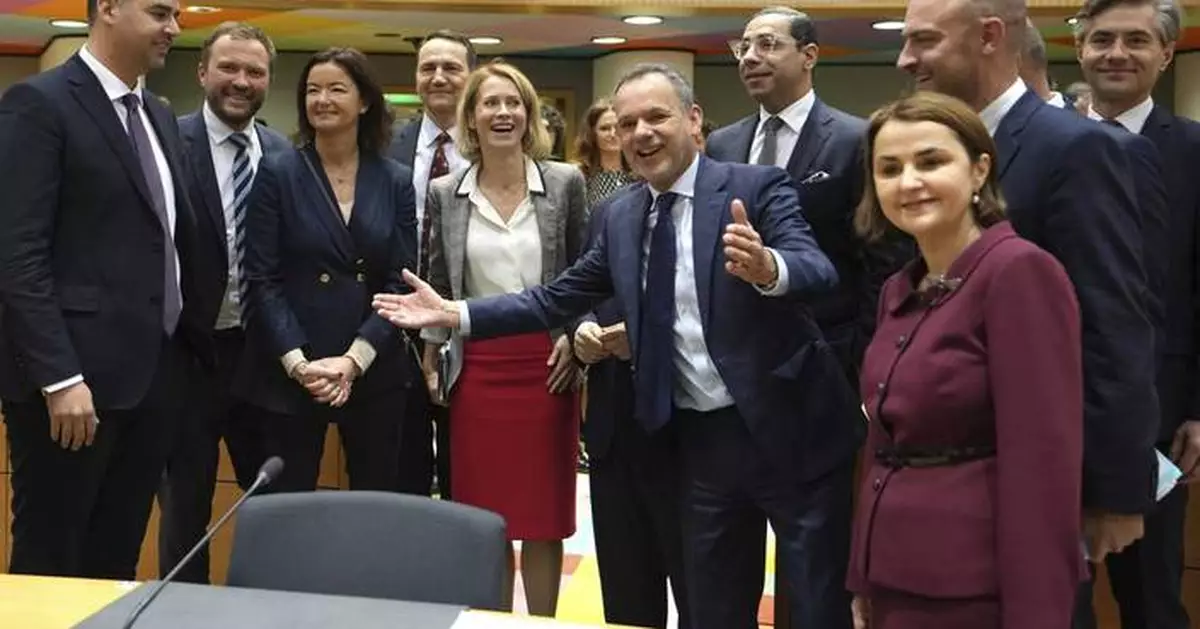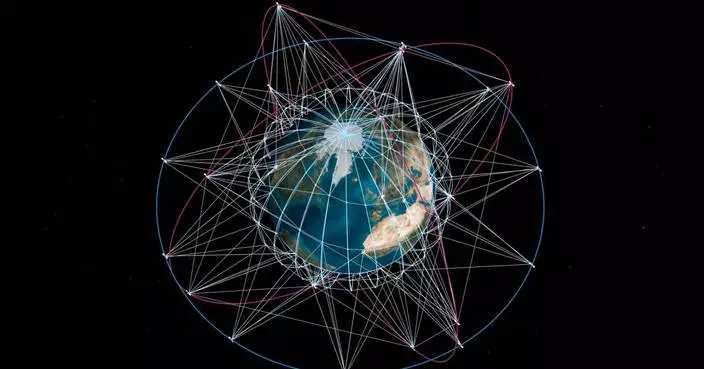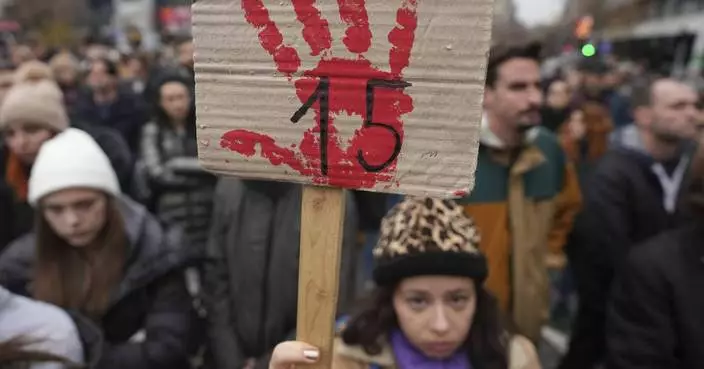BRUSSELS (AP) — European Union nations on Monday set out conditions for lifting sanctions on Syria and kick-starting aid to the conflict-ravaged country amid uncertainty about its new leaders' intentions just over a week after they seized power.
At a meeting in Brussels, the EU's top diplomats said they want guarantees from members of Syria’s interim government that they are preparing for a peaceful political future involving all minority groups, one in which extremism and former allies Russia and Iran have no place.
Click to Gallery
Estonia's Foreign Minister Margus Tsahkna speaks with the media as he arrives for a meeting of EU foreign ministers at the European Council building in Brussels, Monday, Dec 16, 2024. (AP Photo/Virginia Mayo)
European Union foreign policy chief Kaja Kallas arrives for a meeting of EU foreign ministers at the European Council building in Brussels, Monday, Dec 16, 2024. (AP Photo/Virginia Mayo)
Spain's Foreign Minister Jose Manuel Albares Bueno speaks with the media as he arrives for a meeting of EU foreign ministers at the European Council building in Brussels, Monday, Dec. 16, 2024. (AP Photo/Virginia Mayo)
Netherland's Foreign Minister Caspar Veldkamp speaks with the media as he arrives for a meeting of EU foreign ministers at the European Council building in Brussels, Monday, Dec 16, 2024. (AP Photo/Virginia Mayo)
European Union foreign policy chief Kaja Kallas rings a bell to signify the start of a meeting of EU foreign ministers at the European Council building in Brussels, Monday, Dec 16, 2024. (AP Photo/Virginia Mayo)
European Union foreign policy chief Kaja Kallas rings a bell to signify the start of a meeting of EU foreign ministers at the European Council building in Brussels, Monday, Dec 16, 2024. (AP Photo/Virginia Mayo)
European Union foreign ministers pose with European Union foreign policy chief Kaja Kallas, center, as she chairs her first meeting of EU foreign ministers at the European Council building in Brussels, Monday, Dec 16, 2024. (AP Photo/Virginia Mayo)
Since Damascus fell on Dec. 8 and leader Bashar Assad fled to Moscow, Syria’s transition has been surprisingly smooth. Few reports have surfaced of reprisals, revenge killings or sectarian violence. Most looting or destruction has been quickly contained.
But the new leadership has yet to lay out a clear vision of how Syria will be governed. The interim government was set up by former opposition forces led by the Islamic militant group Hayat Tahrir al-Sham, or HTS, a former al-Qaida affiliate that the EU and U.S. consider to be a terrorist organization.
The interim government is set to rule until March. Arab foreign ministers have called for U.N.-supervised elections based on a new constitution. The U.N. envoy to Syria has pressed for removing sanctions.
To understand more, the EU is sending an envoy to Damascus for talks with those at least temporarily in charge.
EU foreign policy chief Kaja Kallas said the bloc wants a “stable, peaceful and all-comprising government in place,” but that it will probably take weeks, if not months, for Syria’s new path to be clear.
“Syria faces an optimistic, positive, but rather uncertain future, and we have to make sure that this goes to the right direction,” she told reporters at a meeting of EU foreign ministers. “For us, it’s not only the words, but we want to see the deeds.”
In a message aimed at the new leaders, Kallas said: “Russia and Iran are not your friends, are not helping you if you are in trouble. They left Assad’s regime, and that is a very clear message showing that their hands are full elsewhere and they are weakened.”
Syria has been shattered by five decades of Assad family rule. Its economy has been destroyed, poverty is widespread, inflation and unemployment are high and corruption seeps through daily life. Millions of people have fled the country.
Hundreds of thousands of them live in Europe, and while some EU countries have suspended asylum applications from Syrian refugees, only those willing to return will be helped to get home, for now.
In 2011, the EU began imposing asset freezes and travel bans on Syrian officials and organizations in response to Assad’s crackdown on civilian protesters, which turned into civil war. The sanctions have been slapped on some 316 people and 86 entities accused of backing Assad.
French Foreign Minister Jean-Noël Barrot said that before any sanctions are lifted or EU development aid sent to Syria, “a certain number of conditions must be met.” They include, he said, “a political transition that allows all Syrian minority groups to be represented, the respect of human rights, the rights of women in Syria (and) the rejection of terrorism and extremism.”
His Spanish counterpart, Jose Manuel Albares, said Syria’s new leaders must understand that the EU has some “red lines” which should be respected before support comes.
“We must guarantee the territorial integrity of Syria and we must make sure that there (is) no foreign interference,” he said. “If those questions are correctly addressed by the new authorities, then we can have a second conversation about sanctions.”
Austrian Foreign Minister Alexander Schallenberg said Europe’s support for Syria’s new leaders should not be “a blank check in advance,” whereby the bloc would be expected to lift all its sanctions and economic restrictions and then start talks.
Dutch Foreign Minister Caspar Veldkamp also told reporters that “regarding the Russian military bases in Syria, we want the Russians out.”
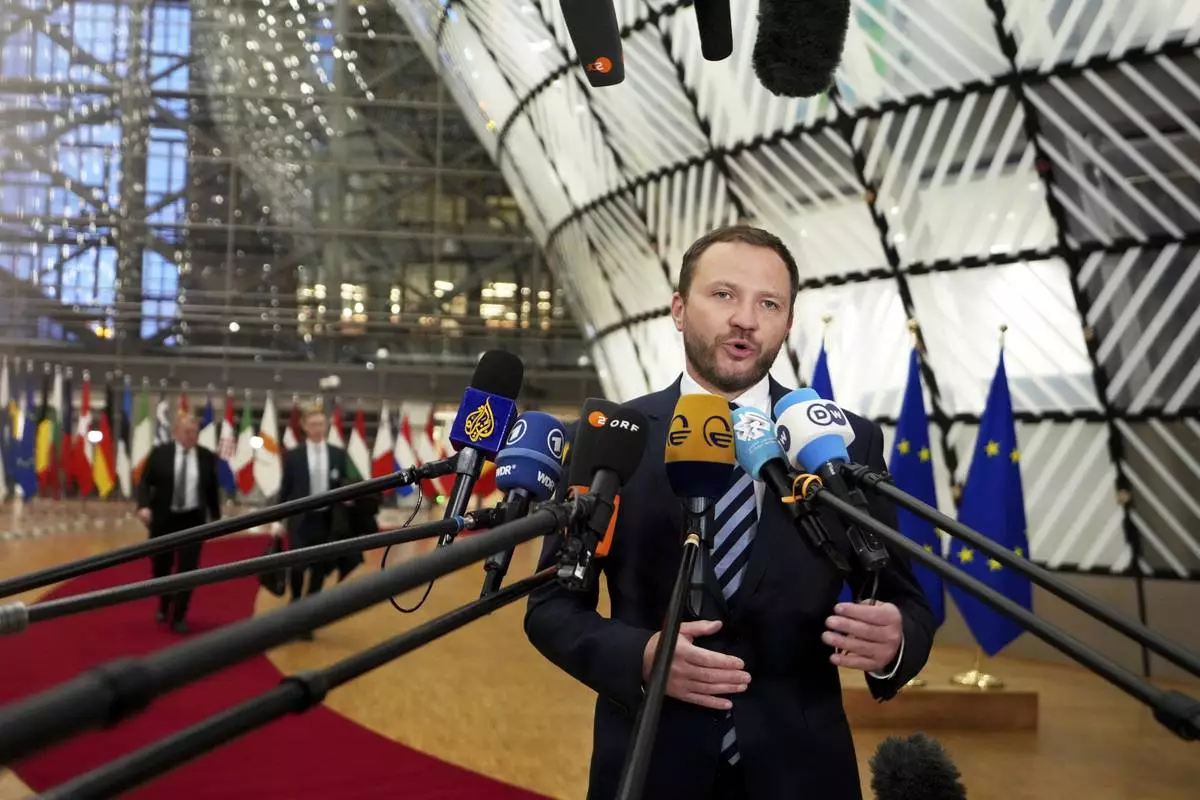
Estonia's Foreign Minister Margus Tsahkna speaks with the media as he arrives for a meeting of EU foreign ministers at the European Council building in Brussels, Monday, Dec 16, 2024. (AP Photo/Virginia Mayo)
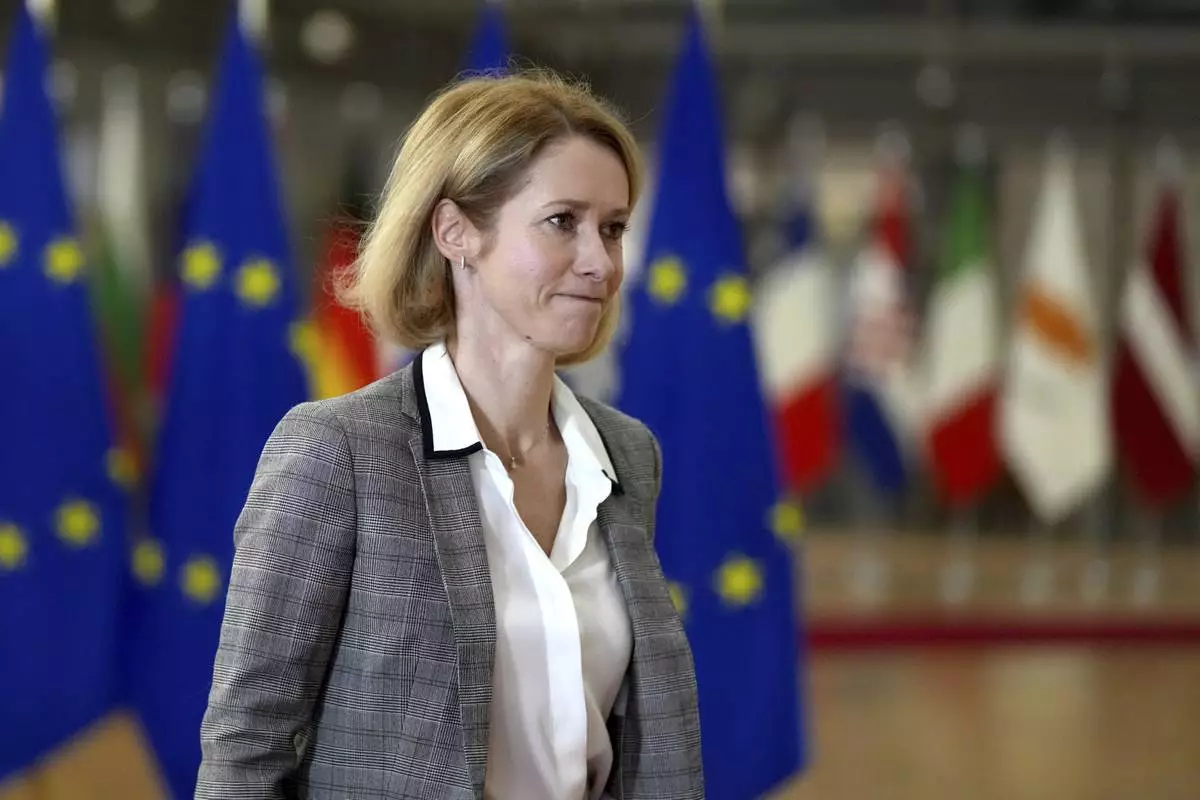
European Union foreign policy chief Kaja Kallas arrives for a meeting of EU foreign ministers at the European Council building in Brussels, Monday, Dec 16, 2024. (AP Photo/Virginia Mayo)
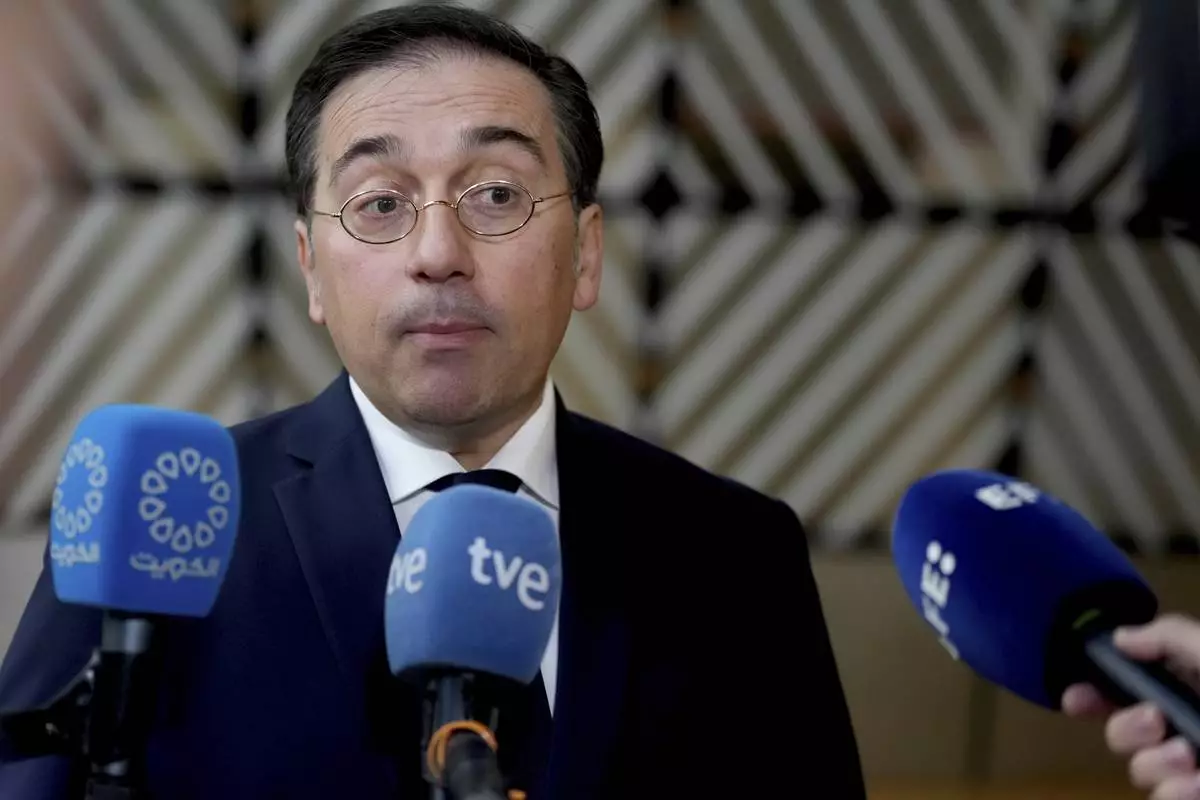
Spain's Foreign Minister Jose Manuel Albares Bueno speaks with the media as he arrives for a meeting of EU foreign ministers at the European Council building in Brussels, Monday, Dec. 16, 2024. (AP Photo/Virginia Mayo)
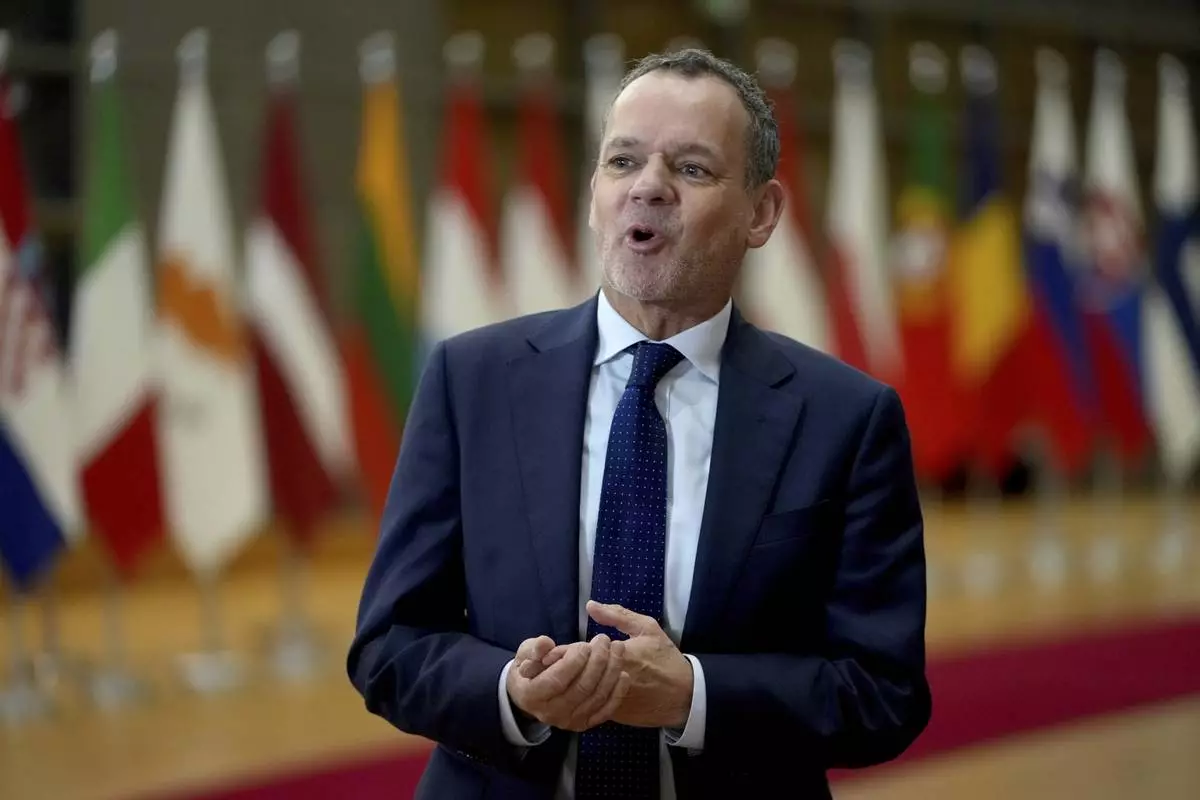
Netherland's Foreign Minister Caspar Veldkamp speaks with the media as he arrives for a meeting of EU foreign ministers at the European Council building in Brussels, Monday, Dec 16, 2024. (AP Photo/Virginia Mayo)
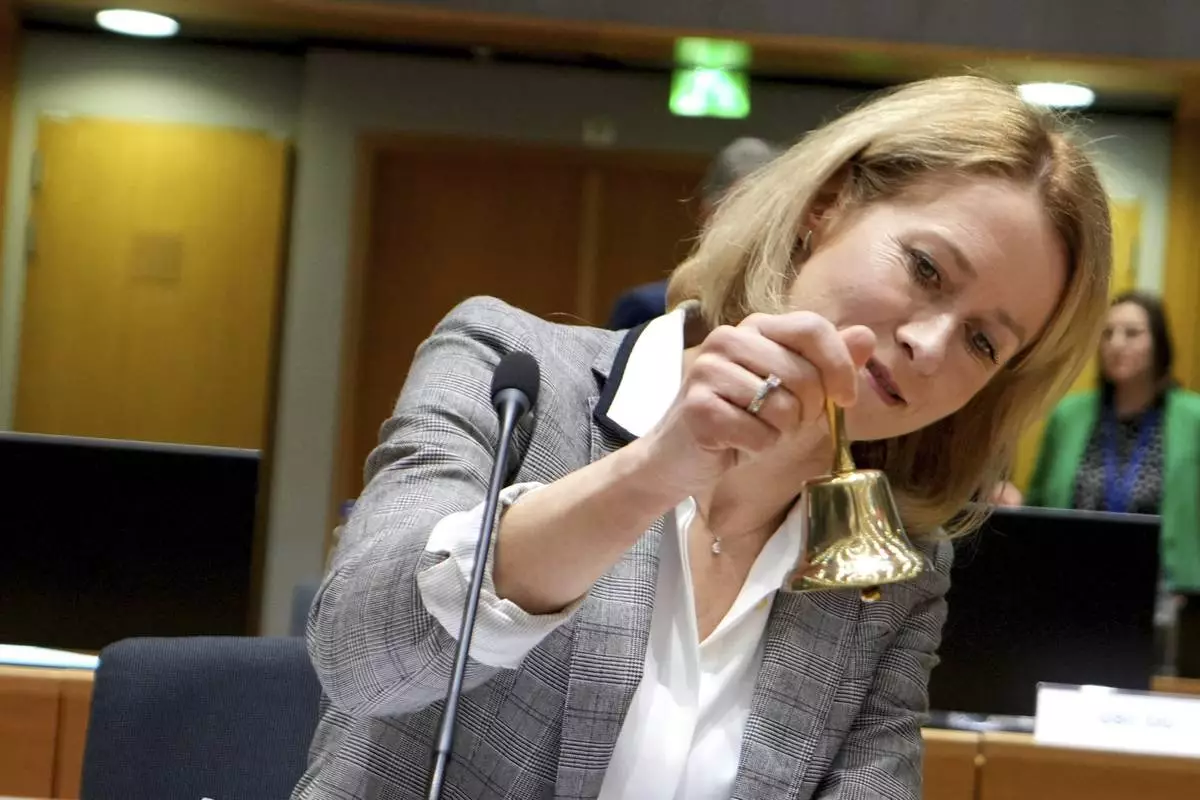
European Union foreign policy chief Kaja Kallas rings a bell to signify the start of a meeting of EU foreign ministers at the European Council building in Brussels, Monday, Dec 16, 2024. (AP Photo/Virginia Mayo)
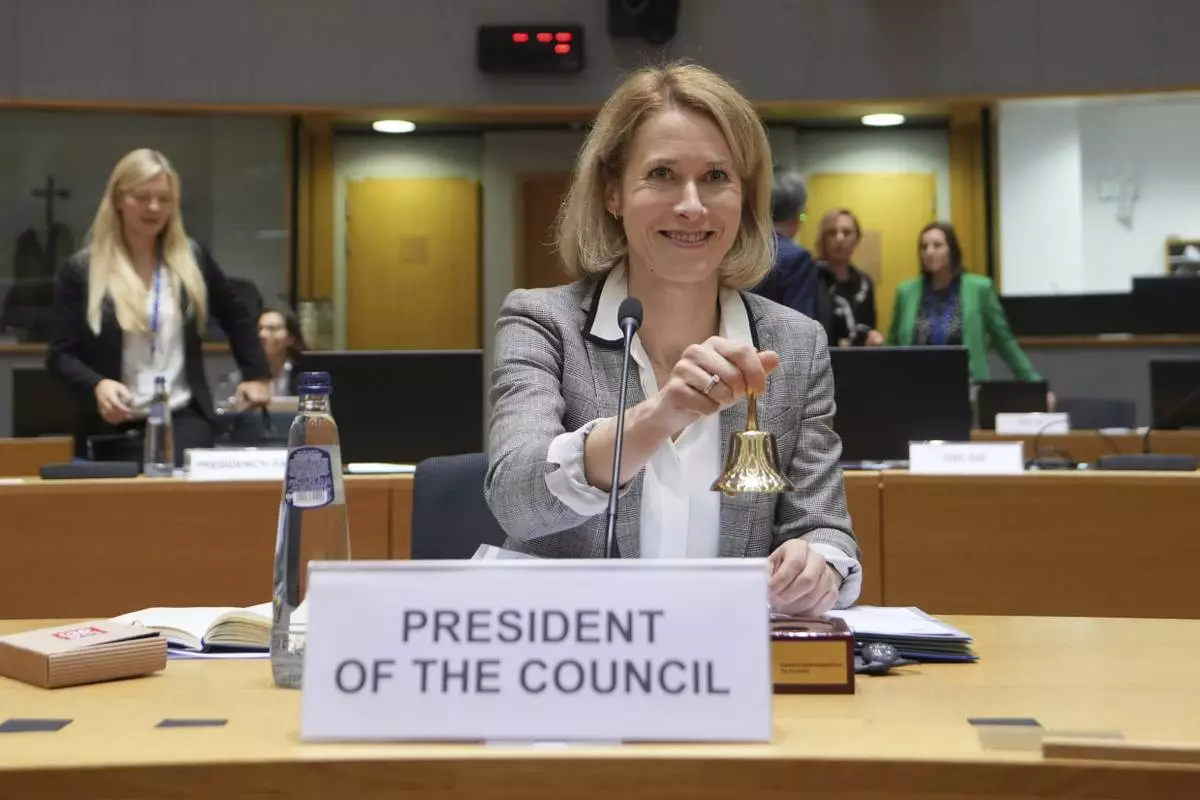
European Union foreign policy chief Kaja Kallas rings a bell to signify the start of a meeting of EU foreign ministers at the European Council building in Brussels, Monday, Dec 16, 2024. (AP Photo/Virginia Mayo)
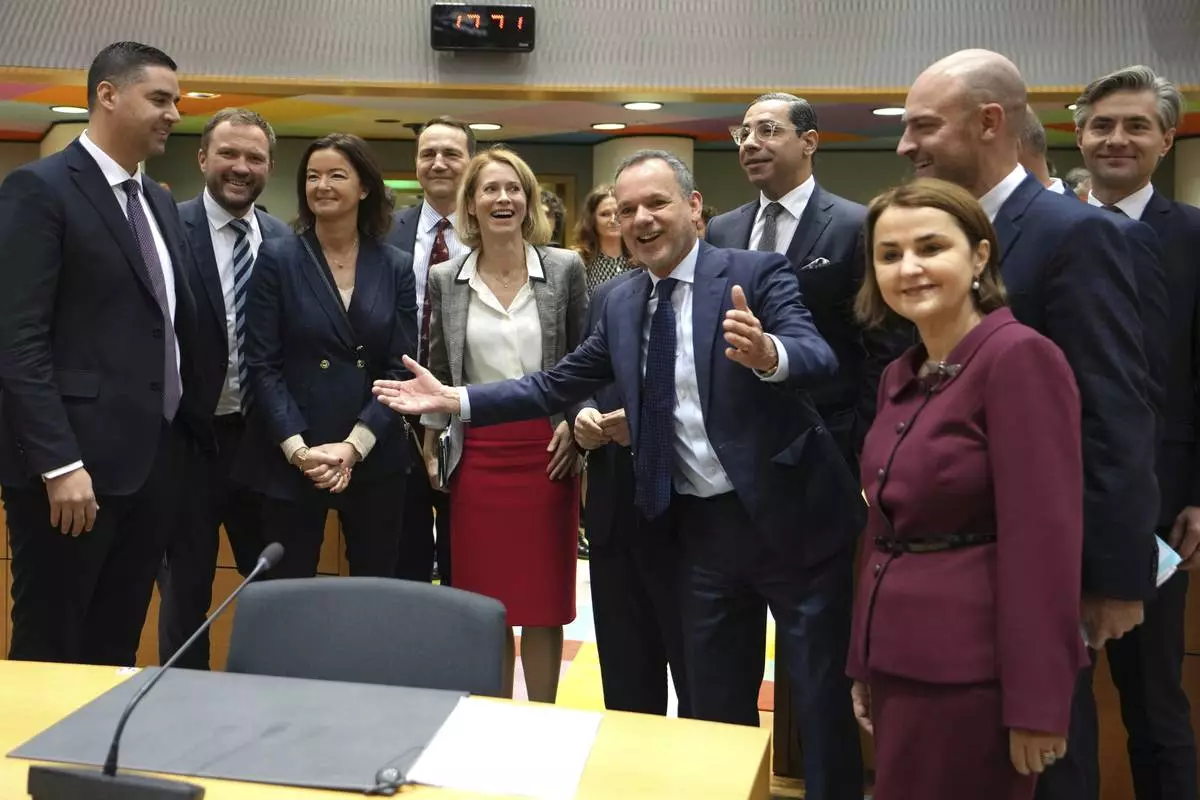
European Union foreign ministers pose with European Union foreign policy chief Kaja Kallas, center, as she chairs her first meeting of EU foreign ministers at the European Council building in Brussels, Monday, Dec 16, 2024. (AP Photo/Virginia Mayo)
BERLIN (AP) — Chancellor Olaf Scholz faced a confidence vote in the German parliament on Monday that he was expected to lose, paving the way for the European Union's most populous member and biggest economy to hold an early election in February.
Scholz's unpopular and notoriously rancorous three-party government collapsed on Nov. 6 when the chancellor fired his finance minister in a long-running dispute over how to revitalize Germany’s stagnant economy, and the minister's pro-business party quit the coalition. That left the remaining two center-left partners without a majority in parliament.
Leaders of several major parties then agreed that a parliamentary election should be held on Feb. 23, seven months earlier than originally planned. Post-World War II Germany's constitution doesn't allow parliament's lower house, or Bundestag, to dissolve itself — so a confidence vote is needed to set in motion the early election.
Scholz's Social Democrats hold 207 seats in the Bundestag and are expected to vote for the chancellor. Their remaining coalition partners, the environmentalist Greens, have 117 and plan to abstain. That should mean Scholz gets nowhere near the majority of 367 in the 733-seat chamber needed to win the confidence vote.
If Scholz loses, it will up to up to President Frank-Walter Steinmeier to decide whether to dissolve the Bundestag. Steinmeier, who said last month that “this country needs stable majorities and a government that is capable of acting,” has 21 days to make that decision. Once parliament is dissolved, the election must be held within 60 days.
In practice, the campaign is already well underway.
Scholz told lawmakers that the election will determine whether “we, as a strong country, dare to invest strongly in our future; do we have confidence in ourselves and our country, or do we put our future on the line? Do we risk our cohesion and our prosperity by delaying long-overdue investments?"
Scholz's pitch to voters includes pledges to “modernize" Germany's strict self-imposed rules on running up debt and to increase the national minimum wage.
Center-right challenger Friedrich Merz responded that “you're leaving the country in one of its biggest economic crises in postwar history.”
“You're standing here and saying, business as usual, let's run up debt at the expense of the younger generation, let's spend money and ... the word ‘competitiveness' of the German economy didn't come up once in the speech you gave today,” Merz said.
The chancellor said Germany is Ukraine’s biggest military supplier in Europe and he wants to keep that up, but underlined his insistence that he won't supply long-range Taurus cruise missiles, over concerns of escalating the war with Russia, or send German troops into the conflict. “We will do nothing that jeopardizes our own security,” he said.
Merz, who has been open to sending the long-range missiles, said that “we don't need any lectures on war and peace” from Scholz's party. He said, however, that the political rivals in Berlin are united in an “absolute will to do everything so that this war in Ukraine ends as quickly as possible.”
Polls show Scholz’s party trailing well behind Merz's main opposition Union bloc. Vice Chancellor Robert Habeck, whose Greens are further back, is also bidding for the top job.
The far-right Alternative for Germany, which is polling strongly, has nominated Alice Weidel as its candidate for chancellor but has no chance of taking the job because other parties refuse to work with it.
Confidence votes are rare in Germany, a country of 83 million people that prizes stability. This is only the sixth time in its postwar history that a chancellor has called one.
The last was in 2005, when then-Chancellor Gerhard Schröder engineered an early election that was narrowly won by center-right challenger Angela Merkel.
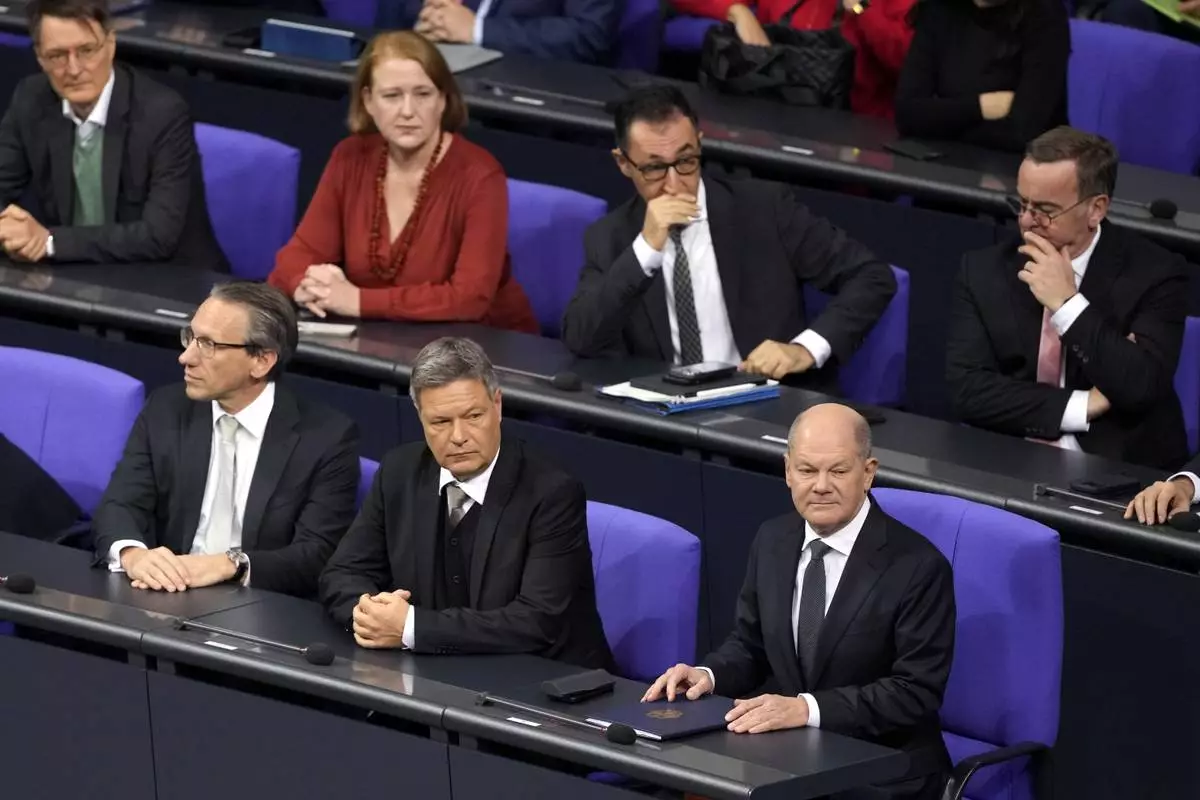
German Chancellor Olaf Scholz,, bottom right, attends a plenary session at the German parliament Bundestag where he faces a vote of confidence, Berlin, Germany, Monday, Dec. 16, 2024. (AP Photo/Markus Schreiber)
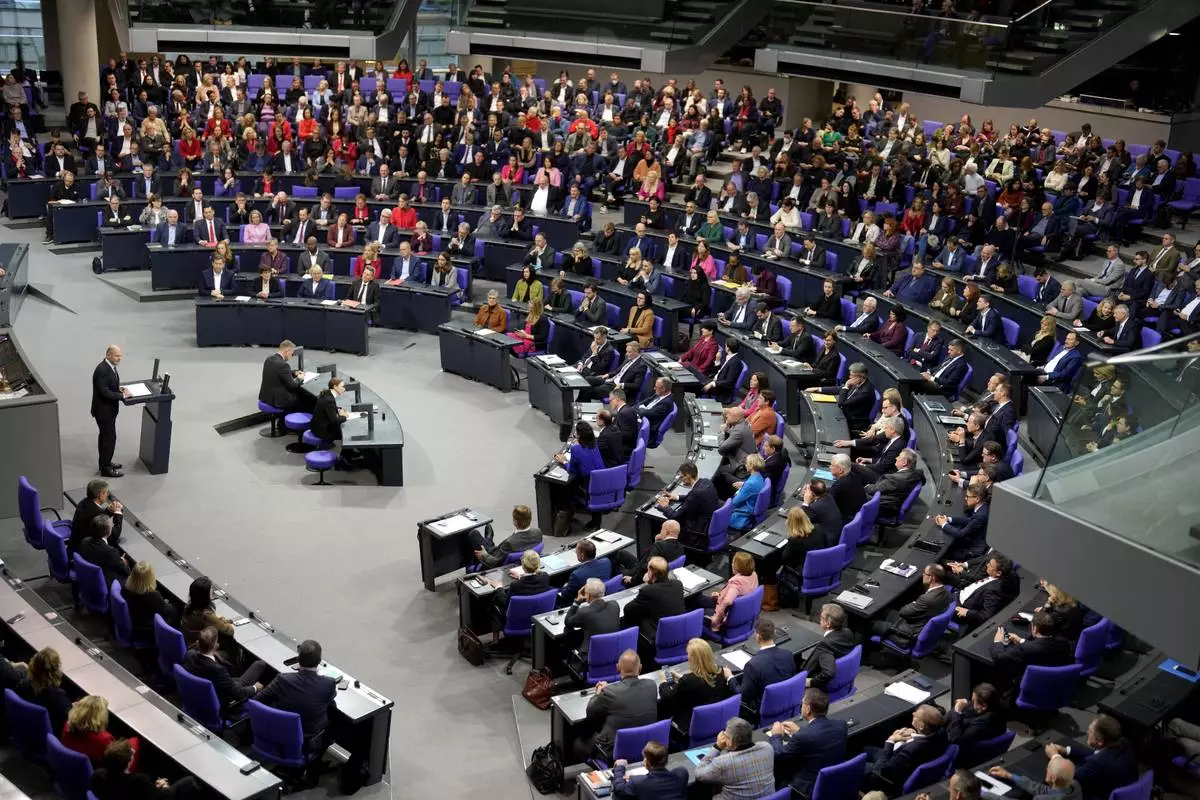
German Chancellor Olaf Scholz speaks during a plenary session at the German parliament Bundestag where he faces a vote of confidence, Berlin, Germany, Monday, Dec. 16, 2024. (AP Photo/Markus Schreiber)
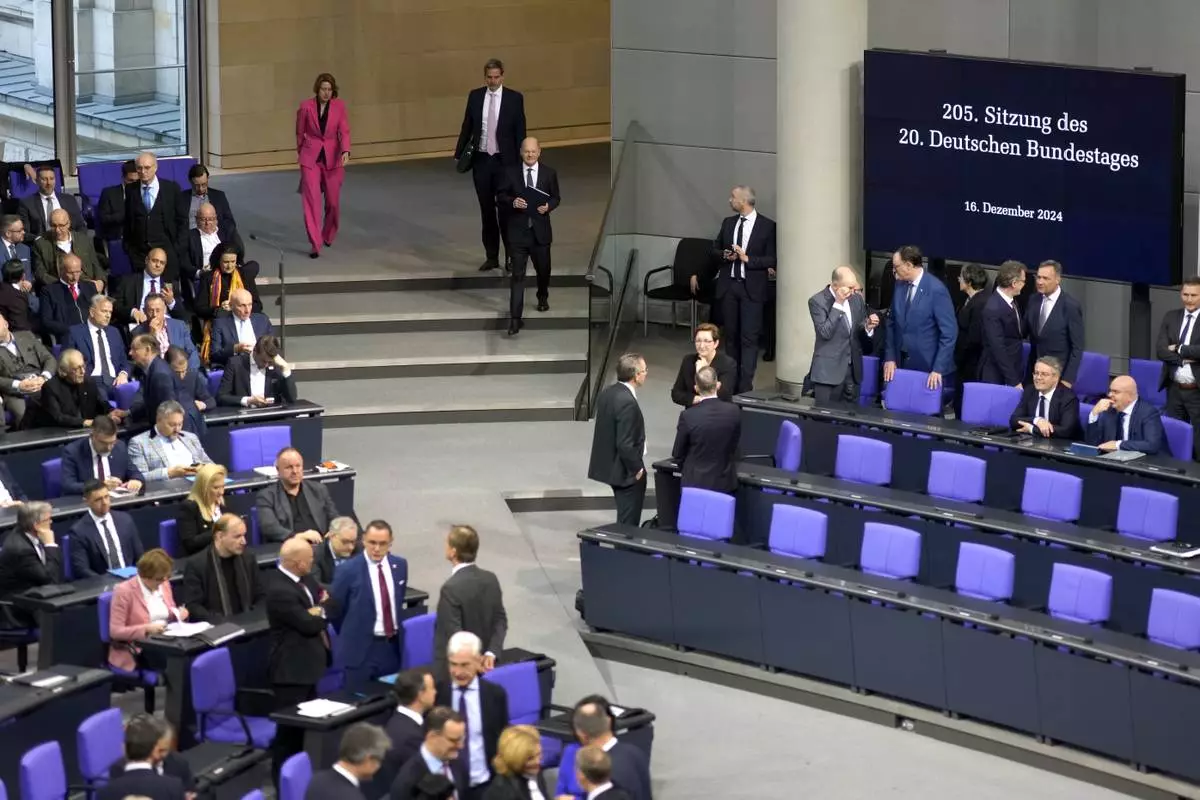
German Chancellor Olaf Scholz, centre arrives for a plenary session at the German parliament Bundestag where he faces a vote of confidence, Berlin, Germany, Monday, Dec. 16, 2024. (AP Photo/Markus Schreiber)
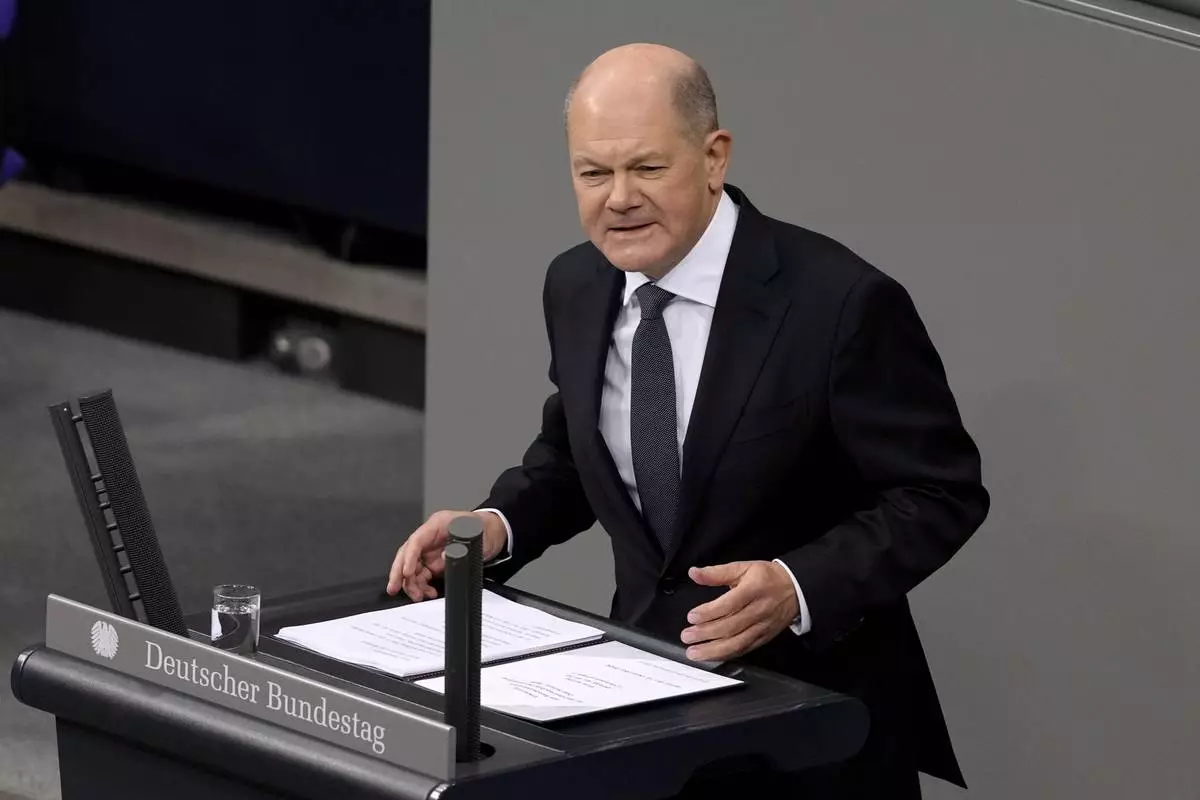
German Chancellor Olaf Scholz speaks during a plenary session at the German parliament Bundestag where he faces a vote of confidence, Berlin, Germany, Monday, Dec. 16, 2024. (AP Photo/Markus Schreiber)
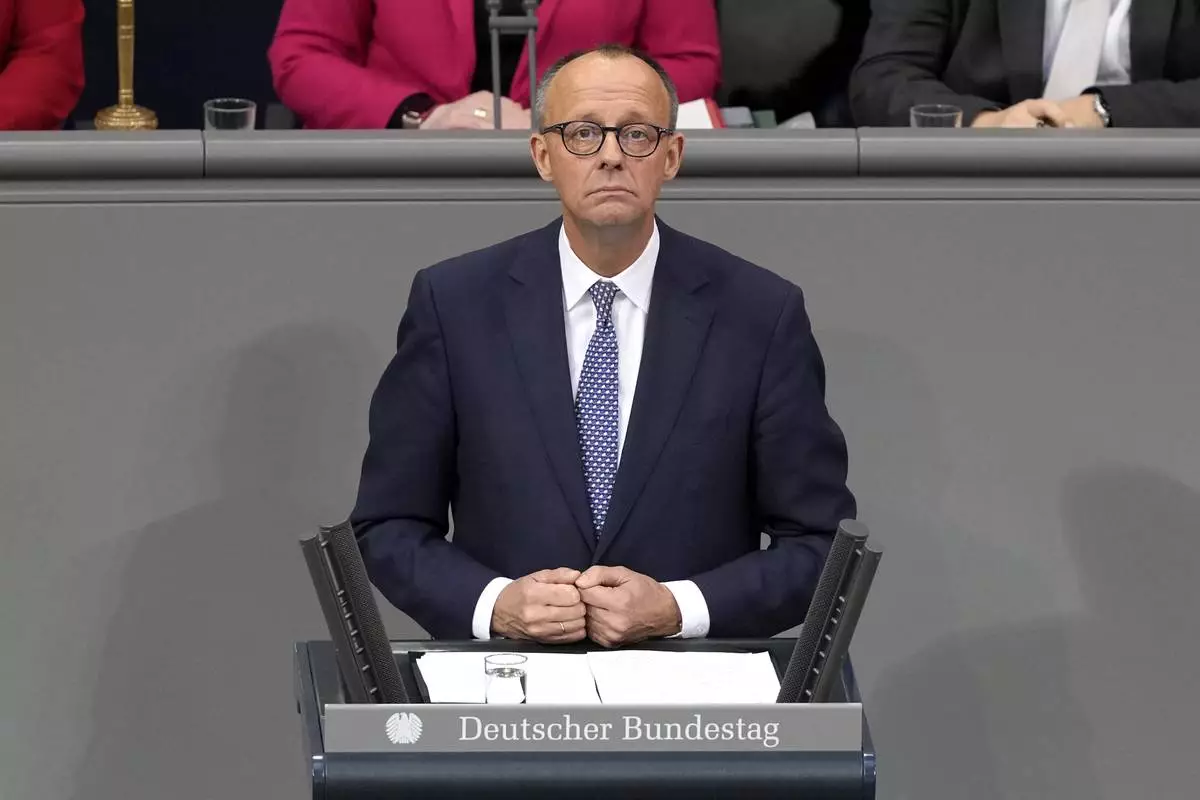
Opposition leader Friedrich Merz of CDU speaks during a plenary session at the German parliament Bundestag where he faces a vote of confidence, Berlin, Germany, Monday, Dec. 16, 2024. (AP Photo/Markus Schreiber)
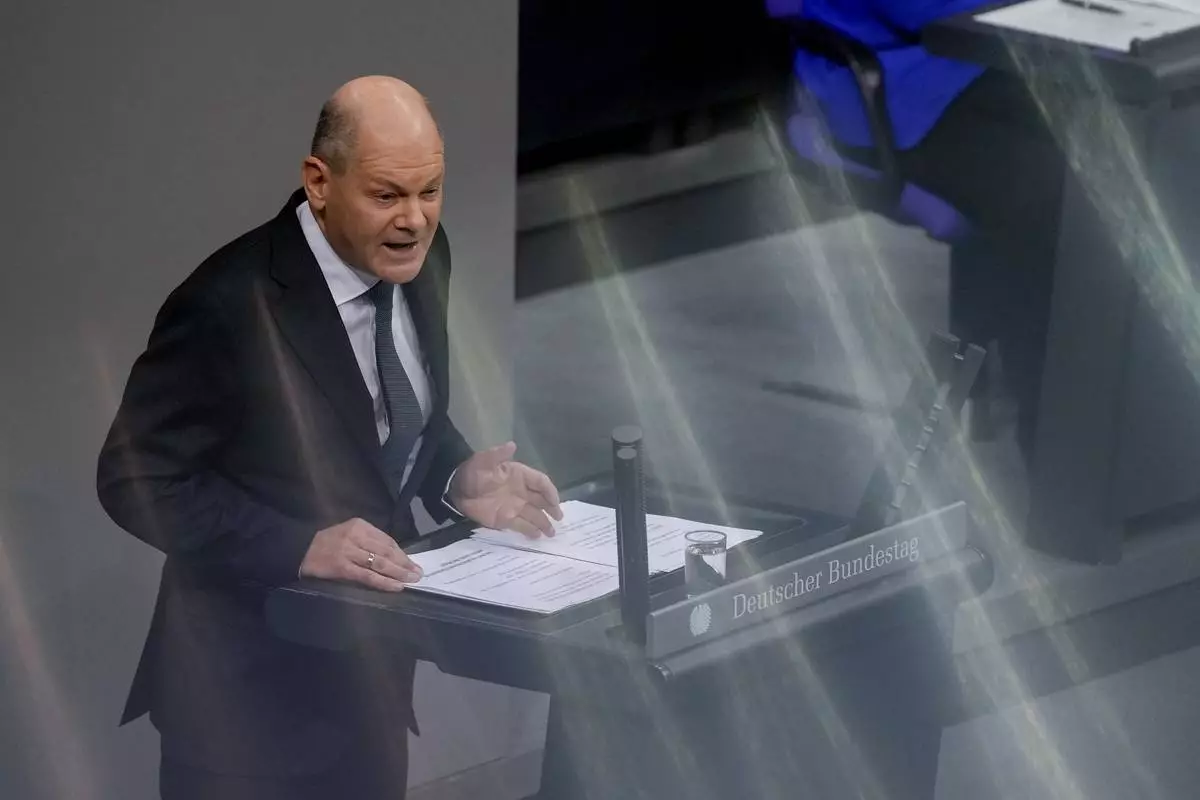
German Chancellor Olaf Scholz speaks during a plenary session at the German parliament Bundestag where he faces a vote of confidence, Berlin, Germany, Monday, Dec. 16, 2024. (AP Photo/Markus Schreiber)
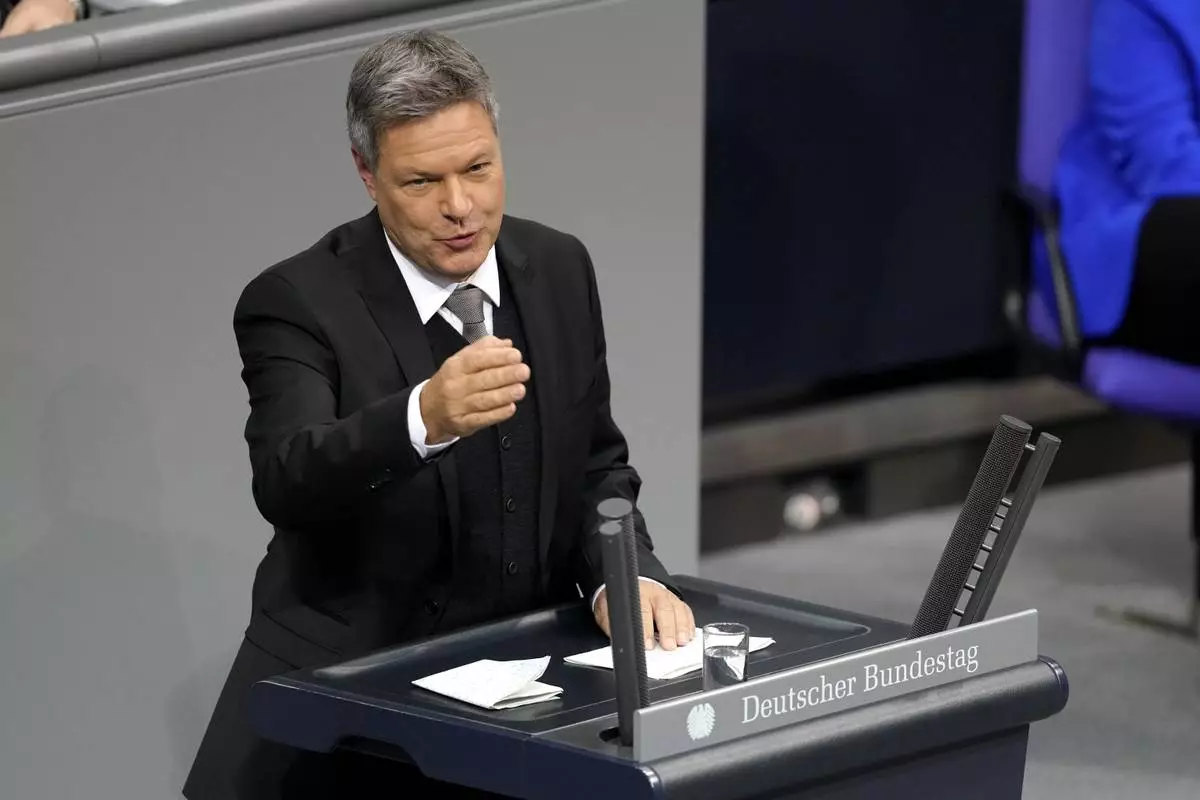
Economy and Climate Minister Robert Habeck speaks during a plenary session at the German parliament Bundestag where he faces a vote of confidence, Berlin, Germany, Monday, Dec. 16, 2024. (AP Photo/Markus Schreiber)
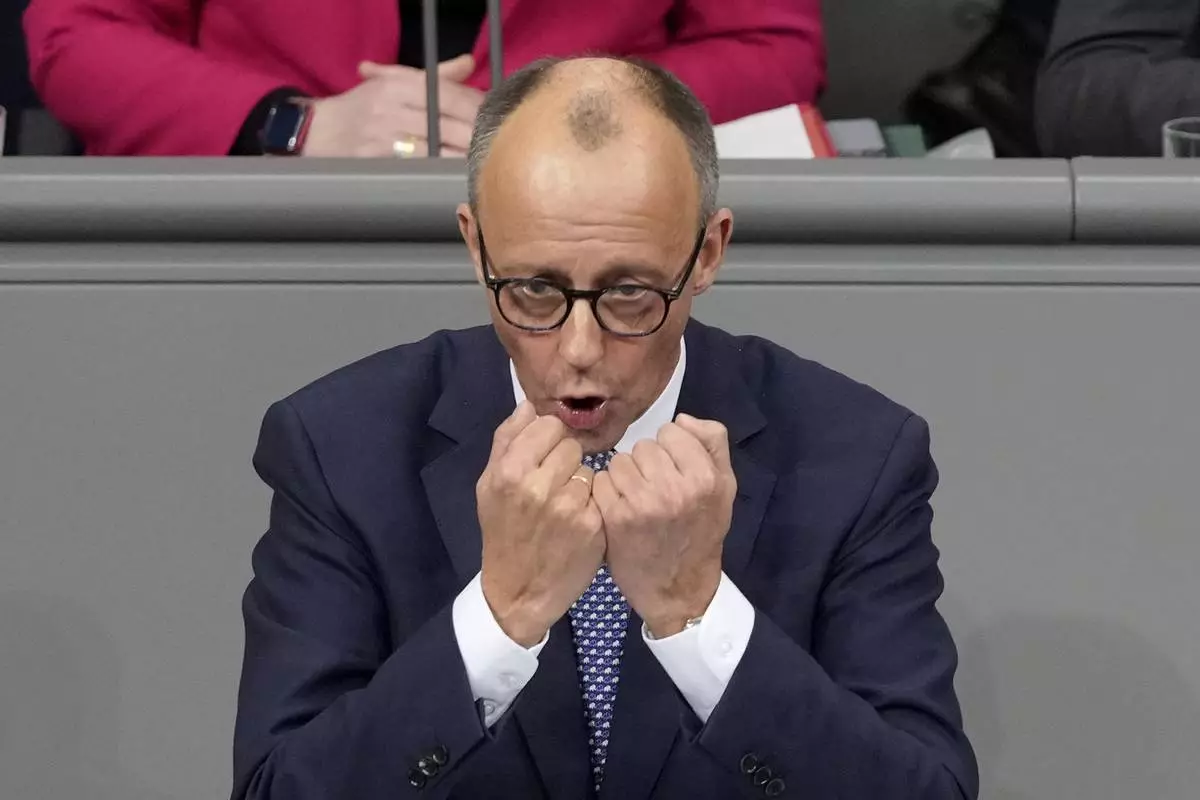
Opposition leader Friedrich Merz of CDU speaks during a plenary session at the German parliament Bundestag where he faces a vote of confidence, Berlin, Germany, Monday, Dec. 16, 2024. (AP Photo/Markus Schreiber)
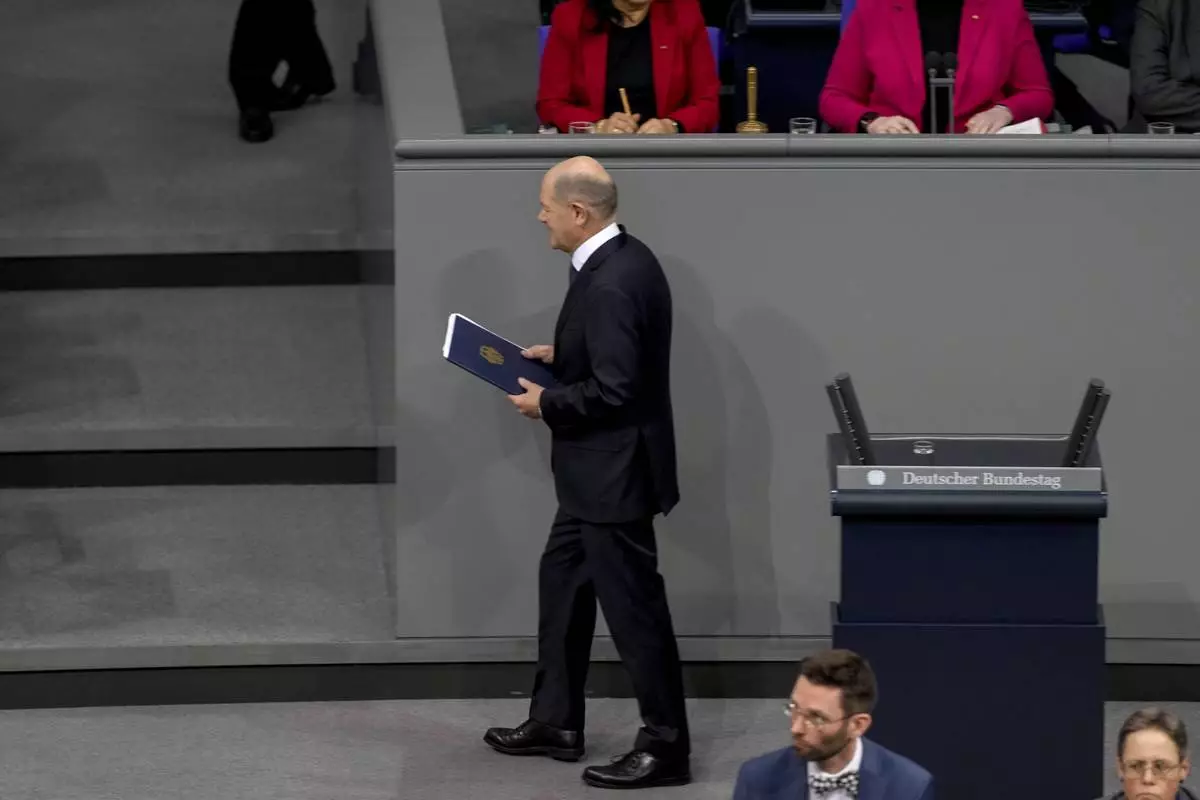
German Chancellor Olaf Scholz leaves after his speech during a plenary session at the German parliament Bundestag where he faces a vote of confidence, Berlin, Germany, Monday, Dec. 16, 2024. (AP Photo/Markus Schreiber)
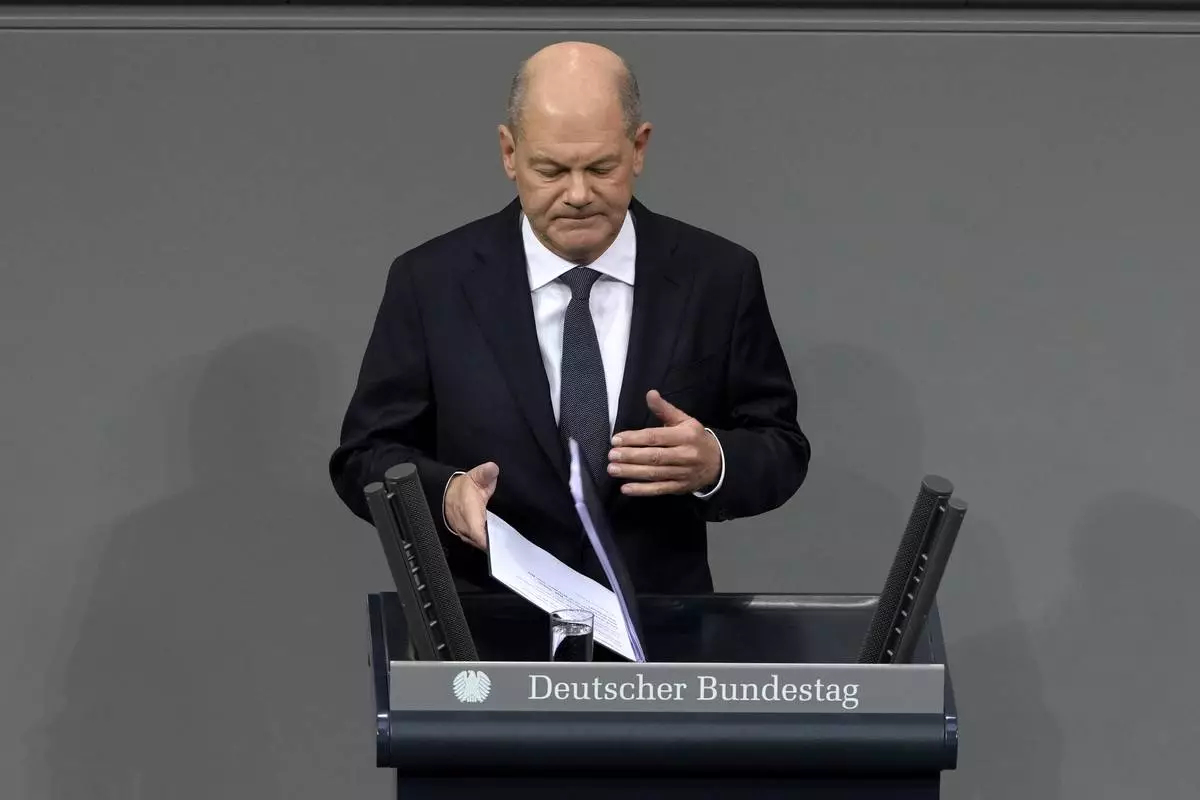
German Chancellor Olaf Scholz speaks during a plenary session at the German parliament Bundestag where he faces a vote of confidence, Berlin, Germany, Monday, Dec. 16, 2024. (AP Photo/Markus Schreiber)
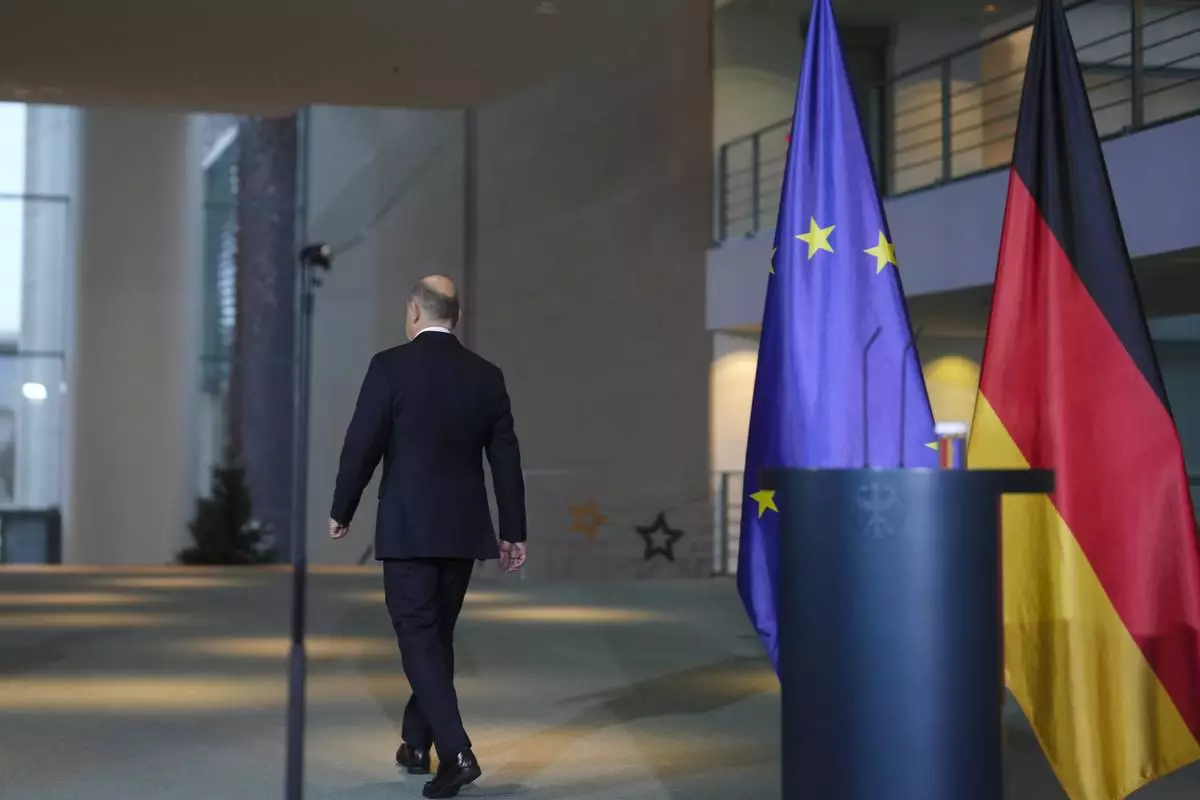
German Chancellor Olaf Scholz leaves after a statement after formally asking for a vote of confidence in parliament, to set the path for an early election in spring 2025, at the chancellery in Berlin, Germany, Wednesday, Dec. 11, 2024. (AP Photo/Markus Schreiber)
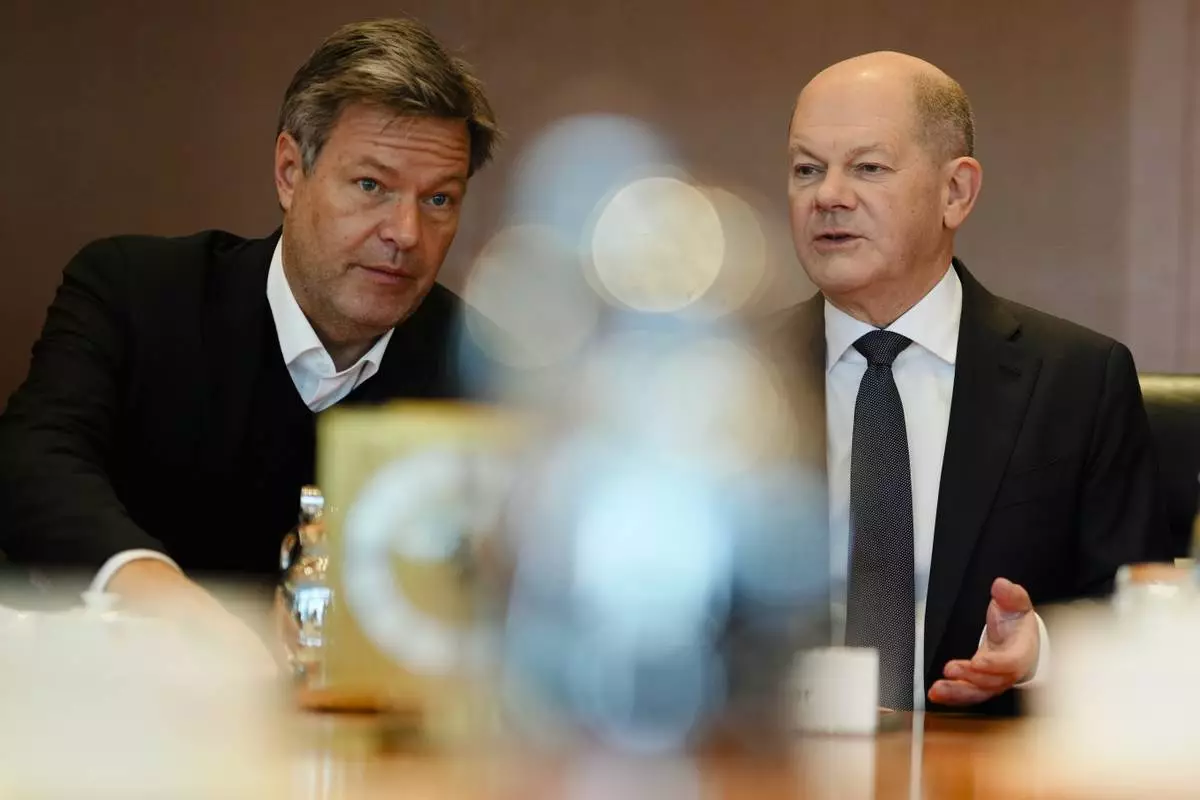
German Chancellor Olaf Scholz, right, speaks with Vice Chancellor and Economy and Climate Minister Robert Habeck, left, during the cabinet meeting at the chancellery in Berlin, Germany, Wednesday, Dec. 11, 2024. (AP Photo/Markus Schreiber)
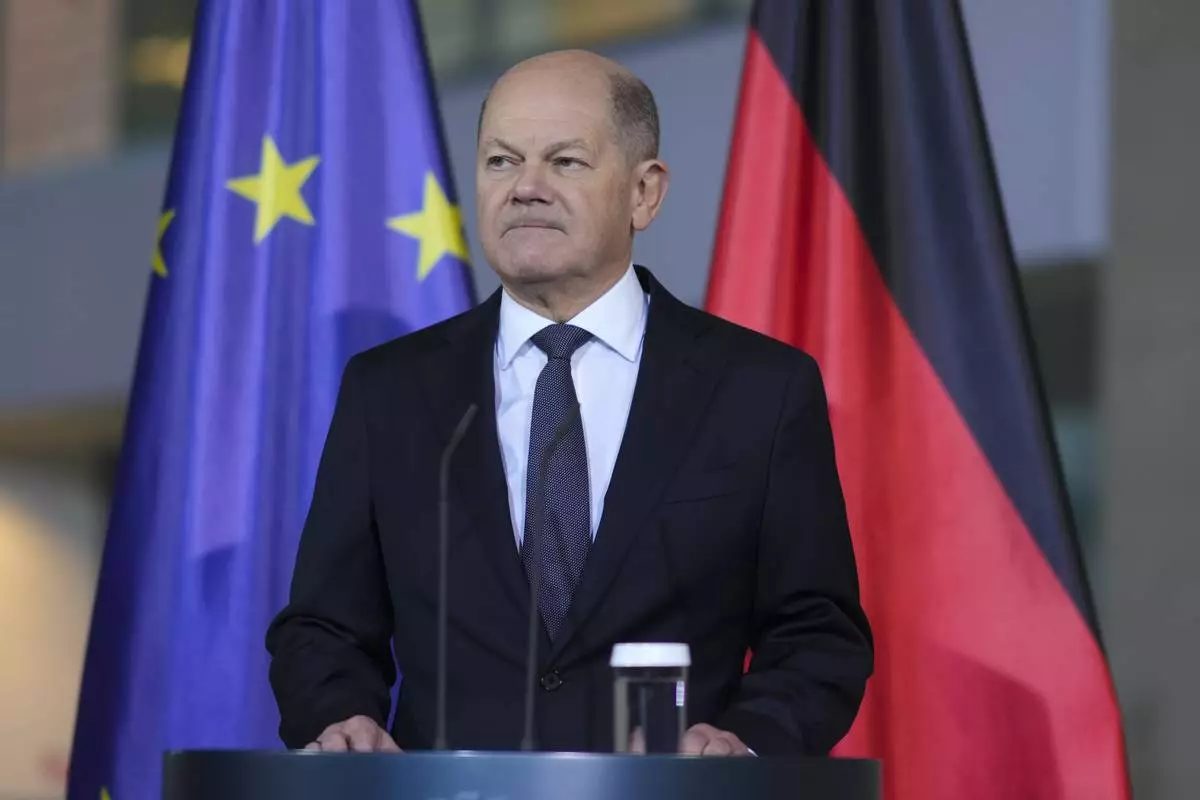
German Chancellor Olaf Scholz makes a statement after formally asking for a vote of confidence in parliament, to set the path for an early election in spring 2025, at the chancellery in Berlin, Germany, Wednesday, Dec. 11, 2024. (AP Photo/Markus Schreiber)









